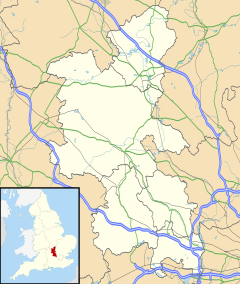High Wycombe
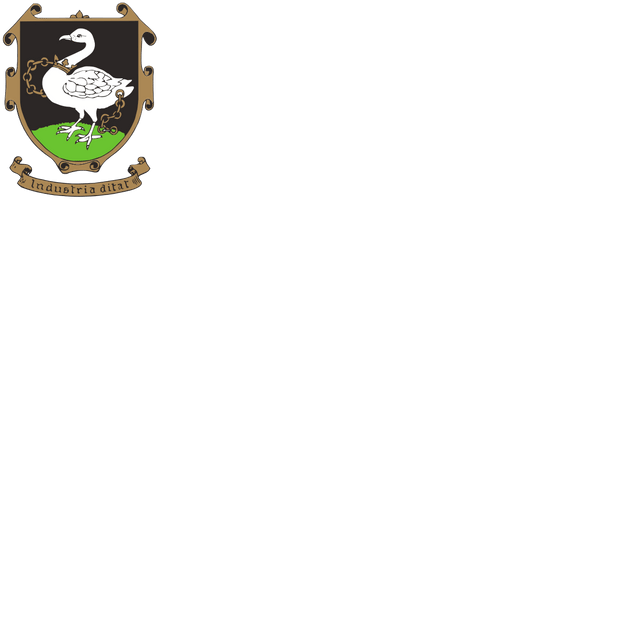
High Wycombe

| High Wycombe | |
|---|---|
 High Wycombe Guildhall, located at the end of the High Street | |
| Population | 125,257 |
| OS grid reference | SU867929 [95] |
| District |
|
| Shire county |
|
| Region |
|
| Country | England |
| Sovereign state | United Kingdom |
| Post town | High Wycombe |
| Postcode district | HP10-15 |
| Dialling code | 01494 |
| Police | Thames Valley |
| Fire | Buckinghamshire |
| Ambulance | South Central |
| EU Parliament | South East England |
| UK Parliament |
|
| Website | www.wycombe.gov.uk [96] |
High Wycombe, often referred to as Wycombe (/ˈwɪkəm/ WIK-əm),[1] is a large town in Buckinghamshire, England. It is 29 miles (47 km) west north west of Charing Cross in London; this information is also engraved on the Corn Market building in the centre of the town. It is also 13.2 miles (21.2 km) south-south-east of the county town of Aylesbury, 23.4 miles (37.7 km) southeast of Oxford, 15.4 miles (24.8 km) north east of Reading and 7.7 miles (12.4 km) north of Maidenhead. According to the ONS official estimates for 2016, High Wycombe has a population of 125,257 and it is the second largest town in the county of Buckinghamshire after Milton Keynes. High Wycombe Urban Area, the conurbation of which the town is the largest component, has a population of 133,204.
High Wycombe is mostly an unparished area in the Wycombe district. Part of the urban area constitutes the civil parish of Chepping Wycombe, which had a population of 14,455 according to the 2001 census – this parish represents that part of the ancient parish of Chepping Wycombe which was outside the former municipal borough of Wycombe. Wycombe is a combination of industrial and market town, with a traditional emphasis on furniture production. There has been a market held in the High Street since at least the Middle Ages.
| High Wycombe | |
|---|---|
 High Wycombe Guildhall, located at the end of the High Street | |
| Population | 125,257 |
| OS grid reference | SU867929 [95] |
| District |
|
| Shire county |
|
| Region |
|
| Country | England |
| Sovereign state | United Kingdom |
| Post town | High Wycombe |
| Postcode district | HP10-15 |
| Dialling code | 01494 |
| Police | Thames Valley |
| Fire | Buckinghamshire |
| Ambulance | South Central |
| EU Parliament | South East England |
| UK Parliament |
|
| Website | www.wycombe.gov.uk [96] |
History
Early history
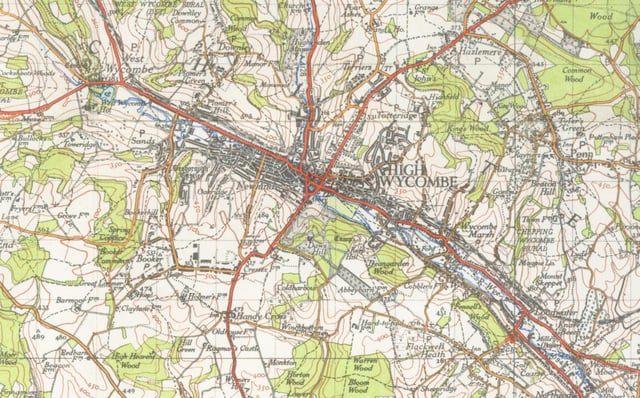
A map of High Wycombe from 1945
The name Wycombe appears to come from the river Wye and the old English word for a wooded valley, combe, but according to the Oxford English Dictionary of Place-Names the name, which was first recorded in 799-802 as 'Wichama', is more likely to be Old English 'wic' and the plural of Old English 'ham', and probably means 'dwellings'; the name of the river was a late back-formation.[2] Wycombe appears in the Domesday Book of 1086 and was noted for having six mills. The town once featured a Roman villa (built 150–170 AD)[3] which has been excavated three times, most recently in 1954. Mosaics and a bathhouse were unearthed at the site on what is now the Rye parkland. High Wycombe was the home of 19th-century Prime Minister Benjamin Disraeli.[4]
The existence of a settlement at High Wycombe was first documented as 'Wicumun' in 970. The parish church was consecrated by Wulfstan, the visiting Bishop of Worcester, in 1086. The town received market borough status in 1222, and built its first moot hall in 1226, with a market hall being built later in 1476.[5]
Trade and industrial development
High Wycombe remained a mill town through Medieval and Tudor times, manufacturing lace and linen cloth. It was also a stopping point on the way from Oxford to London, with many travellers staying in the town's taverns and inns.[5]
The paper industry was notable in 17th and 18th century High Wycombe. The Wye's waters were rich in chalk, and therefore ideal for bleaching pulp. The paper industry was soon overtaken by the cloth industry.
Wycombe's most famous industry, furniture (particularly Windsor chairs) took hold in the 19th century, with furniture factories setting up all over the town. Many terraced workers' houses were built to the east and west of town to accommodate those working in the furniture factories. In 1875, it was estimated that there were 4,700 chairs made per day in High Wycombe. When Queen Victoria visited the town in 1877, the council organised an arch of chairs to be erected over the High Street, with the words "Long live the Queen" printed boldly across the arch for the Queen to pass under. Wycombe Museum includes many examples of locally made chairs and information on the local furniture and lace industries.
The town's population grew from 13,000 residents in 1881 to 29,000 in 1928. Wycombe was completely dominated socially and economically by the furniture industry and, consequently, there was considerable unemployment and social problems when the industry declined in the 1960s.
20th century
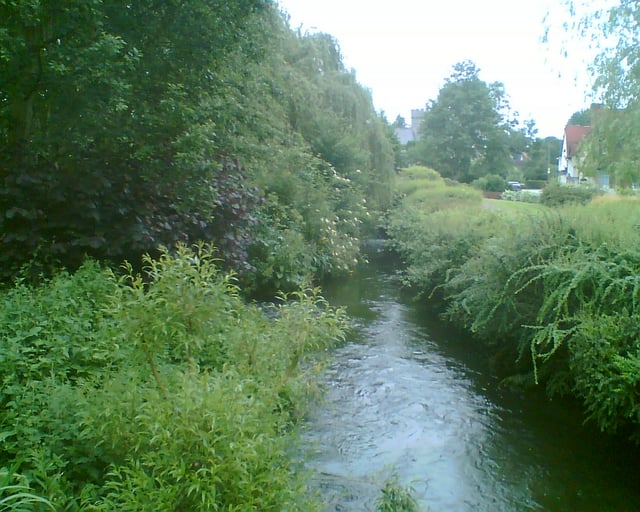
River Wye near Wooburn Industrial Estate
By the 1920s, many of the housing areas of Wycombe had decayed into slums. A slum clearance scheme was initiated by the council in 1932, whereby many areas were completely demolished and the residents rehoused in new estates that sprawled above the town on the valley slopes.[6] Some of the districts demolished were truly decrepit, such as Newland, where most of the houses were condemned as unfit for human habitation, with sewage pouring down the street and people sharing one room in cramped quarters of subdivided flats. However, some areas such as St. Mary's Street contained beautiful old buildings with fine examples of 18th and 19th century architecture.[7]
From 1940 to 1968 High Wycombe was the seat of the RAF Bomber Command. Moreover, during the Second World War, from May 1942 to July 1945, the U.S. Army Air Force's 8th Air Force Bomber Command, codenamed "Pinetree", was based at a former girls' school at High Wycombe. This formally became Headquarters, 8th Air Force, on 22 February 1944.[8]
In the 1960s the town centre was redeveloped. This involved culverting the River Wye under concrete and demolishing most of the old buildings in Wycombe's town centre. Two shopping centres were built along with many new multi-storey car parks, office blocks, flyovers and roundabouts. On the open area known as Frogmoor (or Frogmore) the original cast-iron fountain and some Georgian buildings have been torn down.
Modern-day High Wycombe
High Wycombe comprises a number of suburbs including Booker, Bowerdean, Castlefield, Cressex, Daws Hill, Green Street, Holmers Farm, Micklefield, Sands, Terriers, Totteridge, Downley and Wycombe Marsh, as well as some nearby villages: Hazlemere and Tylers Green. Particular areas in the suburbs of Castlefield, Micklefield, Terriers and Totteridge have high levels of deprivation compared to the rest of the urban area.
Although situated in the county of Buckinghamshire, which is one of the most affluent parts of the country,[9] Wycombe contains some considerably deprived areas.[10] In 2007, a GMB Union survey ranked the Wycombe district as the 4th dirtiest in the South East and the 26th dirtiest in the whole UK.[11][12] The survey found litter on 28.5% of streets and highways. Data for the survey were taken from the Government's 2005/06 Audit Commission.
The town has undergone major redevelopment, including development of the town's existing shopping centre, completion of the Eden Shopping centre, and redevelopment of the Buckinghamshire New University with a large student village and new building on Queen Alexandra Road.[13]
These developments prompted the building of larger blocks of flats, a multimillion-pound hotel in the centre, and a Sainsbury's store on the Oxford road next to the Eden shopping centre and bus station.
Demography
High Wycombe's population figure differs with the varying definitions of the town's area. For the town proper (that is, without the suburbs) it is often given as 77,178. However, Hazlemere is now regarded as part of Wycombe, which makes the population of High Wycombe town 92,300. The High Wycombe urban area (with some surrounding settlements) has a population of 133,204.[14] Which is approximately a 13% increase on the 2001 population of 118,229.[15]
| Place | Population (2001 census) | Population (2011 census) |
| Bourne End/Flackwell Heath | 12,795 | |
| Cookham | 5,304 | 5,108 |
| Great Kingshill | 2,452 | 1,761 |
| Hazlemere/Tylers Green | 20,500 | |
| High Wycombe | 77,178 | 120,256 |
| Walters Ash | 3,853 | |
| Hughenden Valley | 1,915 | |
| TOTAL | 118,229 | 133,204 |
Notes:
Hazlemere/Tylers Green and Bourne End/Flackwell Heath were included as part of the High Wycombe subdivision in the 2011 census.
Hughenden Valley and Walters Ash were separate urban areas in the 2001 census.
The Walters Ash subdivision includes the village of Naphill.
Based on the 2001 census and the 2007 Indices of Multiple Deprivation data, High Wycombe has the lowest proportion of people from the white ethnic group in Buckinghamshire, representing 76% of the population.[16] The next biggest ethnic group in High Wycombe is the Asian and Asian British group, representing 16% of the population. The Black/Black British ethnic group was represented by 5% and the Mixed ethnic group by 2% of the population.[16] English is the first language spoken by 66% of school pupils living in High Wycombe. Of the 34% of pupils living in the town whose first language is not English, 19% speak Punjabi and just over 6% Urdu as a first language.[16].
Politics
Wycombe's political history extends back to 1295. The Wycombe constituency is currently a Conservative majority.
Notable MPs
High Wycombe has been home to two Prime Ministers:
the Earl of Shelburne lived at what is now Wycombe Abbey (and was also MP for the town)
Benjamin Disraeli, who lived at nearby Hughenden Manor, was defeated as an independent candidate in 1832, but won election in 1868 and 1874-1880 as a Conservative. Disraeli made his first political speech in Wycombe, from the portico over the door of the Red Lion Hotel on the High Street (now Iceland/Bargain buys).
Local government
The constituency is strongly Conservative outside High Wycombe town; in the town itself the political landscape is more mixed with some wards represented by independent, Labour and Liberal Democrat councillors.
Weighing the mayor
A ceremony carried out in the town since 1678[17] involves the weighing of the mayor. At the beginning and end of each year of service, the mayor is weighed in full view of the public to see whether or not he has gained weight, presumably at the taxpayers' expense. The custom, which has survived to the present day, employs the same weighing apparatus used since the 19th century. When the result is known, the town crier announces "And no more!" if the mayor has not gained weight or "And some more!" if he has. His actual weight is not declared.[18]
Education
Buckinghamshire is one of the few counties that still has a selective educational system based on the former tripartite system. Pupils in their last year at primary school take what is commonly known as the 11+ exam. Their score in this exam determines whether they are accepted into a grammar school or a secondary modern school.
Primary schools
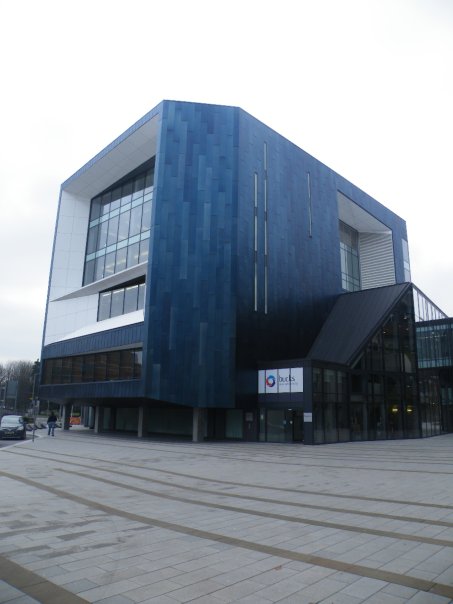
Gateway Building, Buckinghamshire New University.
Catchment area primary schools in High Wycombe[19]
Ash Hill Combined School
Beechview Junior School
Booker Hill Combined School
Castlefield Combined School
Chepping View Combined School
Hamilton Academy
Hannah Ball School
Highworth Combined School & Nursery
High Wycombe Church of England Combined School
Kings Wood Combined School
Marsh Infants School
Millbrook Combined School
Oakridge Combined School
St Michael's Catholic School (combined primary and secondary school)
The Disraeli Combined School and Children's Centre
West Wycombe Combined School
Secondary schools
Cressex Community School
Highcrest Academy
John Hampden Grammar School
St Michael's Catholic School (combined primary and secondary school)
Royal Grammar School
Wycombe High School
Sir William Ramsay School
Holmer Green Senior School
Independent schools
Crown House School[20]
Godstowe Preparatory School
Pipers Corner School
Wycombe Abbey
Further and higher education
Amersham & Wycombe College is a further education college located near High Wycombe at Flackwell Heath, with campuses also at Chesham and Amersham. High Wycombe is home to the main campus of Buckinghamshire New University. It is located in the centre of the town on the former site of the High Wycombe College of Art and Technology. It received its university charter in summer 2007.
Media coverage
High Wycombe has been featured in the national media in recent years for a number of different reasons, including seasonal coverage of the local library's refusal to display a Christmas carol service poster[21] and other stories such as the triple shooting[22] of three young Asian men, a small-scale riot between feuding families and gangs in which knives, metal poles, and an axe were used[23] whilst a gunman sprayed bullets; and the shooting and murder of Natasha Derby at point-blank range in the middle of a busy dance floor at a town centre venue.[24][25]
The town appeared in national and international media after anti-terrorism raids were carried out across the town on 10 August 2006 as part of the 2006 transatlantic aircraft plot.[26] Five arrests were made at three different houses in the town's Totteridge and Micklefield areas. A small number of houses in High Wycombe were evacuated in Walton Drive, which is thought to be because one of the raided houses contained dangerous liquid chemicals.
A three-mile (4.8 km) no-flight zone over the town was ordered. Other raids and arrests were also made in East London and Birmingham.
King's Wood to the north of the town was cordoned off for four months to be searched by police, and many suspicious items were allegedly found including explosives, detonators, weapons and hate tapes. Other woodlands in the Booker area of the town and the M40 at High Wycombe as well as nearby woods were also under observation. Explosives officers were called to the motorway, as were forensic officers. A lane of the motorway was closed as a precaution.
On 21 December 2009, heavy snowfall hit the town, paralysing its road network (which is mainly on steep hills), and causing major disruption to refuse services for several weeks. Staff and customers of the John Lewis department store were stranded overnight, leading to national news reports and interviews from GMTV and other radio stations on the morning of 22 December.[27]
Notable residents (past and present)
Entertainment and the media
Colin Baker – actor who played the sixth incarnation of the Doctor in Doctor Who, and columnist for the Bucks Free Press.[28]
Katy Brand - Comedian and writer.
Mighty Boosh stars Noel Fielding and Dave Brown met when they attended Bucks New University in Wycombe. Julian Barratt then joined the group after Fielding scouted him performing in the Wycombe Swan theatre.[29]
Judy Boucher – country and RnB singer originally from St Vincent.[30]
Stevyn Colgan – author and artist.
Giles Cooper, entertainment producer and promoter. Best known as Chairman of the annual Royal Variety Performance[31]
James Corden – actor, comedian, writer, producer and television host.[32]
Terry Cox – drummer, the Pentangle, David Bowie, Elton John, Charles Aznavour and many others.[33]
Ian Dury – rock & roll singer and songwriter. He was educated at the Royal Grammar School.[34]
Joanne Froggatt – British actress best known for her role as Anna Bates in Downton Abbey.
Terry Pratchett – author, educated at John Hampden Grammar School.
Aaron Taylor-Johnson – actor.[35]
Theo James - actor.
Howard Jones – singer and songwriter.[36] He was educated at the Royal Grammar School.
Jim Jones – former member of Thee Hypnotics, Black Moses and currently frontman of The Jim Jones Revue.[37]
Alex Kew – actor and musician.[38]
Eric Knowles – Antiques Roadshow presenter, currently lives in the town.[39]
Sally Philips – comic actress.[40]
Leigh-Anne Pinnock – member of girl band Little Mix, winners of The X Factor 2011.[41]
Mark Reilly – Lead singer of the band Matt Bianco.
Charlotte Roche – British-born German television presenter, actress, singer and author in March 2008.[42]
Laura Sadler – actress of Grange Hill and Holby City.[43]
Dusty Springfield – singer.[44]
Ian Stanley – keyboard player with rock band Tears for Fears.
Colin Teague – film and television director.
Sy Thomas – TV presenter, standup comedian and actor.[45]
Frankie Vaughan – pop singer.[46]
Young Guns – High Wycombe-based band.[47]
Alexander Aze - child actor
Sports
Elliot Benyon – footballer with Wealdstone
Dominic Blizzard – former footballer most recently with Plymouth Argyle.
Simon Church – Welsh international footballer.[48]
Matt Dawson – scrum-half for England rugby union team which won the Rugby World Cup in 2003. He was educated at the Royal Grammar School.[49]
Luke Donald – former world no.1 golfer, educated at the Royal Grammar School.[50]
Jack Goff – motor-racing driver, currently racing in the British Touring Car Championship
Isa Guha – England Women's cricketer and Women's World Cup winner.[51]
Jean Hawes - hockey player who received an MBE in 2007.
Tom Ingram – motor-racing driver, currently racing in the British Touring Car Championship.[52]
Mike Keen – former footballer and manager, winner of the League Cup in 1967.[53]
Robbie Kerr – motor-racing driver.
Phil Newport – former Worcestershire and England cricketer.[54]
Tom Rees – England and London Wasps Rugby Flanker, educated at the Royal Grammar School.[55]
Nicola Sanders – Olympic athlete.[56]
Wilf Slack – Middlesex and England cricketer.[57]
Christian Wade – England Wasps player, educated at the Royal Grammar School and raised in High Wycombe.[58]
Other fields
Heston Blumenthal – celebrity chef and owner of the Michelin 3-star Fat Duck restaurant. He was born in the town and educated at John Hampden Grammar School.[59]
Mitford family – aristocrats.[60]
Roger Scruton – philosopher, educated at the Royal Grammar School.
Geoffrey De Havilland – aviation pioneer and aircraft engineer. Born at Terriers House.[61]
Benjamin Disraeli – 19th century prime minister, politician, and literary figure.[62]
Eric Gill – sculptor and print maker.[63]
Karl Popper – philosopher.[64]
Jean Shrimpton – supermodel.[65]
Heather Stewart-Whyte – supermodel.[66]
Transport
Road
The town's nearest motorway is the M40, which has two junctions serving Wycombe: junction 3 for Loudwater and High Wycombe (east) and junction 4 at Handy Cross roundabout for central Wycombe, Marlow and Maidenhead. Junction 4 is a major interchange between the M40 and A404 trunk road which provides a link to the M4. It had suffered from heavy congestion but was improved by the Highways Agency in 2006.[67] Junction 3 is restricted; only traffic going towards and coming from London can join and exit respectively. The M25 and M4 are also fairly close.
Other roads include the A404 towards Marlow and Amersham; the A4010 towards Aylesbury; and the A40 towards Beaconsfield and Oxford.
Bus
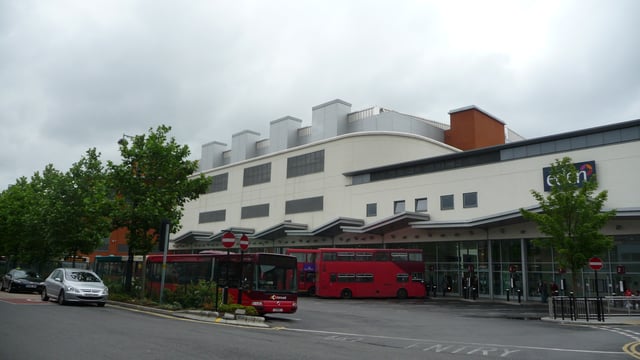
High Wycombe Eden bus station in July 2009
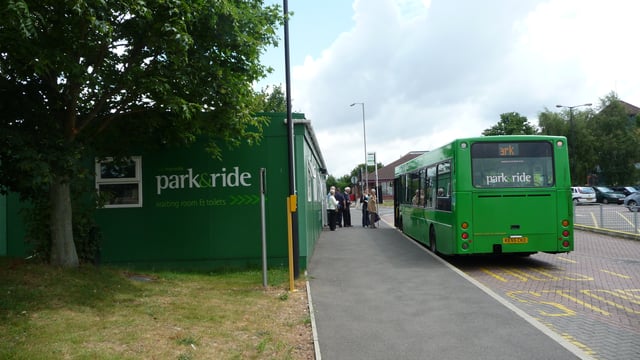
Park & ride in July 2009
High Wycombe Eden bus station is served by Arriva Shires & Essex and Carousel Buses. Major destinations include Reading, Slough, Aylesbury, Heathrow Airport, Maidenhead, Watford, Chesham, Uxbridge and Berkhamsted. In November 2013, First Berkshire & The Thames Valley added express route X9 to Maidenhead to its existing X74 express to Slough.[68] Other operators serving the town include Redline, Red Rose and Z&S Buses.
High Wycombe is served by one of Buckinghamshire's Rainbow Routes network of services. Originally piloted in Aylesbury, its success led to a network being set up in the town. Rainbow Routes is a partnership between Buckinghamshire County Council and local operators Arriva Shires & Essex and Carousel Buses. They provide regular services within the town and its suburbs, and this network includes:[69]
Pink Route 30 – Arriva Shires & Essex, every 15 minutes to Downley
Green Route 31 – Arriva Shires & Essex, every 15 minutes to Penn and Hazlemere
Blue Route 32 – Arriva Shires & Essex, every 15 minutes to Micklefield and Booker
Red Route 33 – Arriva Shires & Essex, every 12 minutes to Totteridge and Castlefield
Purple Route 35/36 – Carousel Buses, every 30 minutes to Flackwell Heath
Orange Route 39 – Carousel Buses, every 20 minutes to Hicks Farm
The town also has a Park and Ride facility located in Cressex, near junction 4 of the M40. Services run to the town centre, passing the railway station, it also serves Wycombe Hospital and Hicks Farm Rise.[70]
Coach
The only coach service to enter the town centre is National Express route 737 service from Oxford to Stansted Airport.[71] High Wycombe Coachway close to junction 4 of the M40 is served by National Express services to destinations across the United Kingdom. It opened in January 2016.[72][73] It is linked to the town by local buses and by park and ride buses.[74]
Rail
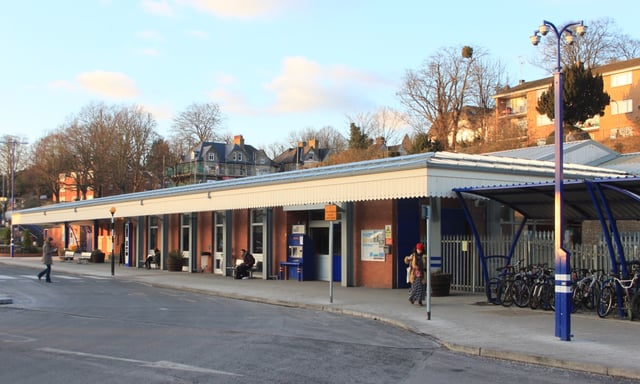
High Wycombe railway station in February 2015
The town is served by High Wycombe railway station on the Chiltern Main Line, with services operated by Chiltern Railways from London Marylebone to Aylesbury, Oxford, Stratford-upon-Avon, Birmingham Snow Hill and Kidderminster.[75][76] The station is the busiest in South Buckinghamshire. Express services travel to London in 23 minutes, slower trains take up to 45 minutes.
The Wycombe Railway ran from High Wycombe to Maidenhead on the Great Western Main Line through Loudwater and Bourne End. However, it was a victim of the Beeching cuts with the Wycombe to Bourne End section closed in May 1970. The southern section remains open as part of the Marlow Branch Line.[77]
Air
Heathrow Airport is the nearest international airport, located just outside Buckinghamshire in Hillingdon. Wycombe Air Park on the southern edge of the town is popular with learning pilots and gliders.
Facilities and places of interest
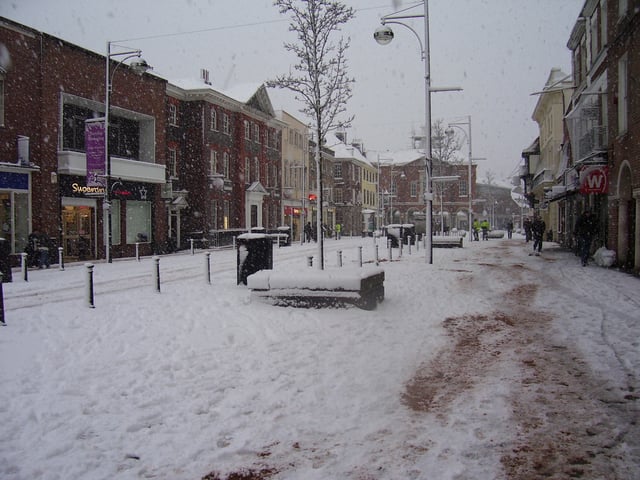
High Wycombe town centre covered by snow in February 2007
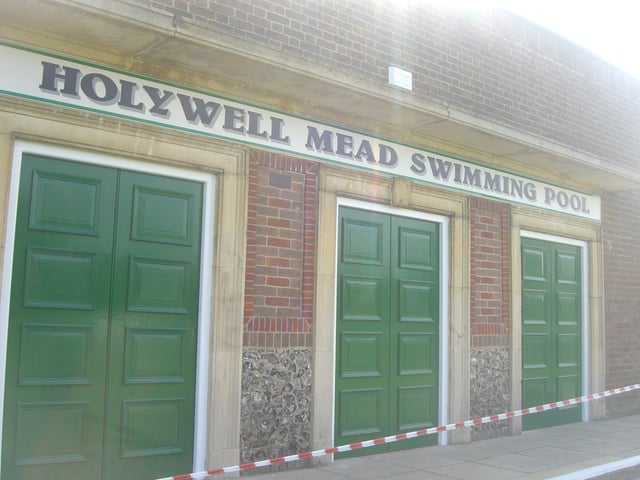
High Wycombe, Holywell Mead swimming pool, closed 2009 and reopened 2011
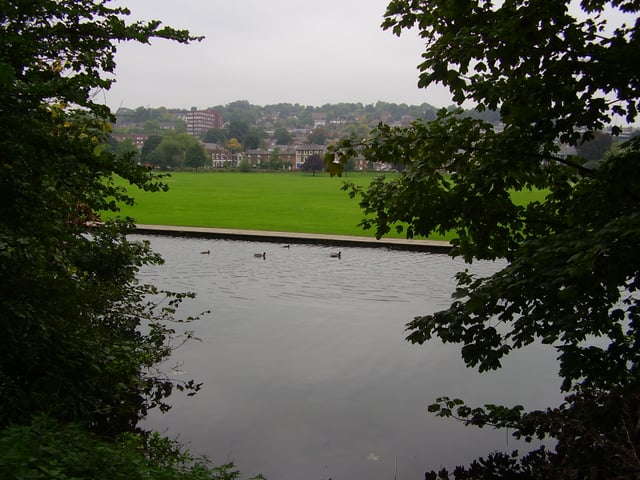
The Dyke, with the Rye beyond
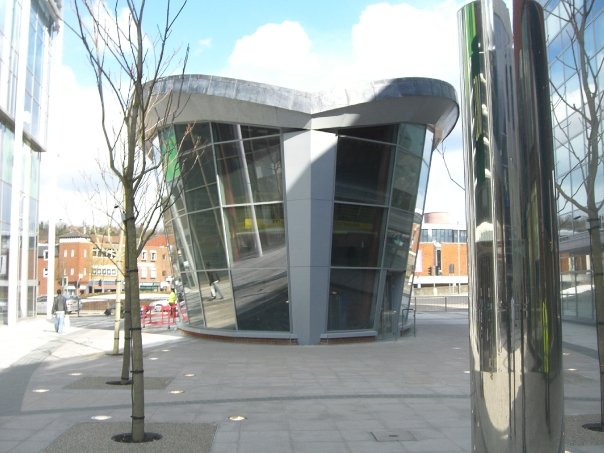
High Wycombe Eden Centre in 2007
There are two shopping centres: the Eden Centre which spreads from the High Street under the Abbey Way flyover to the south of the A40; and the Chilterns Centre, which is located between Queen's Square and Frogmoor to the north. The High Street (pedestrianised in the early 1990s) has a number of 18th and 19th century buildings, and ends at the colonnaded Guildhall that was built in 1757 by Henry Keene and renovated in 1859. The small octagonal-shaped Cornmarket opposite, known locally as the Pepper Pot, was rebuilt to designs by Robert Adam in 1761. The large parish church of All Saints[78] was founded in 1086, enlarged in the 18th century and extensively restored in 1889. There is a large, well equipped theatre, the Wycombe Swan, which hosts many acts and shows before or after their appearance in the West End.
In March 2008, a new development of the town centre was completed. This included the demolition and movement of the bus station and the brand new Eden Shopping Centre, with 107 shops, new restaurants, a large bowling alley and cinema and new housing. The old Octagon shopping centre was connected to the new development. The complex, one of the largest in the country, is seen as a major milestone in the regeneration of the town.
There are out-of-town retail outlets in the suburbs of Cressex (including John Lewis, Asda and TGI Fridays), and Wycombe Marsh, where there is small retail park of shops and restaurants including Hobbycraft, PC World, Pets at Home, Argos, Homebase and M&S Simply Food. Desborough Road provides a secondary shopping area with more independent traders and a number of takeaways.
To the east of the town centre is the extensive Rye park (and river) and dyke. The park had an outdoor swimming pool, which closed in 2009. The pool has now reopened together with a new gym and has been renamed as the Rye Lido.[79] The River Wye winds through the green space, which is particularly attractive during the summer. Wycombe's yearly "Asian Mela" takes place on the Rye. There is a museum on Priory Avenue in the town centre situated on its own grounds and including a Norman castle mound. The theme of the museum is the history of Wycombe, with the main focus being the chair industry.
Wycombe town centre is home to many public houses and bars, especially in the Frogmoor area. The White Horse pub appeared on 'Britain's toughest pubs'.[80]
The town features the old Wycombe Summit,[81] formerly the largest dry ski slope in England, before it was destroyed in a fire. Construction work was due to start in September 2008, on what would have become England's third and largest indoor real snow ski centre. In May 2009, it was announced that construction would be delayed due to 'difficulties getting a planning consent amendment.'[81] As of 31 January 2012 it was announced that the site was up for sale.[82]
Hughenden Manor borders the northern urban fringe of High Wycombe, approximately 2 miles (3 km) from the centre of town. Built in the Regency period, the architecturally appealing house was also home to Benjamin Disraeli for three decades in the mid-19th century. The three-floor mansion is situated in its own extensive grounds with beautifully landscaped gardens which back into the attractive Chiltern countryside. It is open to the public all year round as an historical attraction.
The local council maintains a landmark statue of a red lion above the former Woolworth's store on the High Street. Its significance dates back to when the building was the Red Lion Hotel. Since its installation, the lion has been replaced several times and has had to undergo extensive repair due to damage from both the elements and human interference. Another notable landmark is the ruins of the Hospital of St John the Baptist,[83] which is located on Easton Street, just east of the town centre opposite the Rye parkland, and dates to the 12th century. The stone structure is one of the very oldest in Wycombe, and is said to contain stone used from the Roman villa on the Rye.
The site of the ancient Desborough Castle is situated between the Desborough and Castlefield suburbs of the town, and provides their names.
Industry
Wycombe was once renowned for chairmaking (the town's football team is nicknamed the 'Chairboys') and furniture design remains an important element of the town's university curriculum, Buckinghamshire New University. Among the best known furniture companies were Ercol and E Gomme. The River Wye runs through the valley, where beech trees were cut down by the chair industry to forming the town centre (circa 1700), with housing along the slopes (some areas are still surrounded by woods). The town was also home to the worldwide postage stamp and banknote printer Harrison and Sons. More recent industries in the town include the production of paper, precision instruments, clothing and plastics. Many of these are situated in an industrial area of the Cressex district, southwest of the town centre. The two largest sites belong to the companies Swan (tobacco papers, filters and matches) and Verco (office furniture), who until 2004 sponsored the local football team, Wycombe Wanderers.
Local attractions
[[INLINE_IMAGE|//upload.wikimedia.org/wikipedia/commons/thumb/5/5b/NTE_icon.svg/15px-NTE_icon.svg.png|//upload.wikimedia.org/wikipedia/commons/thumb/5/5b/NTE_icon.svg/23px-NTE_icon.svg.png 1.5x, //upload.wikimedia.org/wikipedia/commons/thumb/5/5b/NTE_icon.svg/30px-NTE_icon.svg.png 2x|NTE icon.svg|h15|w15]] Bradenham Manor House
[[INLINE_IMAGE|//upload.wikimedia.org/wikipedia/commons/thumb/a/ab/UKAL_icon.svg/18px-UKAL_icon.svg.png|//upload.wikimedia.org/wikipedia/commons/thumb/a/ab/UKAL_icon.svg/27px-UKAL_icon.svg.png 1.5x, //upload.wikimedia.org/wikipedia/commons/thumb/a/ab/UKAL_icon.svg/36px-UKAL_icon.svg.png 2x|UKAL icon.svg|h11|w18]] Chiltern Hills
[[INLINE_IMAGE|//upload.wikimedia.org/wikipedia/commons/thumb/6/69/Museum_icon.svg/13px-Museum_icon.svg.png|//upload.wikimedia.org/wikipedia/commons/thumb/6/69/Museum_icon.svg/20px-Museum_icon.svg.png 1.5x, //upload.wikimedia.org/wikipedia/commons/thumb/6/69/Museum_icon.svg/26px-Museum_icon.svg.png 2x|Museum icon.svg|h13|w13]] High Wycombe Chair Making Museum
[[INLINE_IMAGE|//upload.wikimedia.org/wikipedia/commons/thumb/5/5a/HH_icon.svg/15px-HH_icon.svg.png|//upload.wikimedia.org/wikipedia/commons/thumb/5/5a/HH_icon.svg/23px-HH_icon.svg.png 1.5x, //upload.wikimedia.org/wikipedia/commons/thumb/5/5a/HH_icon.svg/30px-HH_icon.svg.png 2x|HH icon.svg|h15|w15]] Hughenden Manor
[[INLINE_IMAGE|//upload.wikimedia.org/wikipedia/commons/thumb/2/2f/Museum_icon_%28red%29.svg/13px-Museum_icon_%28red%29.svg.png|//upload.wikimedia.org/wikipedia/commons/thumb/2/2f/Museum_icon_%28red%29.svg/20px-Museum_icon_%28red%29.svg.png 1.5x, //upload.wikimedia.org/wikipedia/commons/thumb/2/2f/Museum_icon_%28red%29.svg/26px-Museum_icon_%28red%29.svg.png 2x|Museum icon (red).svg|h13|w13]] Hellfire Caves
[[INLINE_IMAGE|//upload.wikimedia.org/wikipedia/commons/thumb/5/5a/HH_icon.svg/15px-HH_icon.svg.png|//upload.wikimedia.org/wikipedia/commons/thumb/5/5a/HH_icon.svg/23px-HH_icon.svg.png 1.5x, //upload.wikimedia.org/wikipedia/commons/thumb/5/5a/HH_icon.svg/30px-HH_icon.svg.png 2x|HH icon.svg|h15|w15]] West Wycombe Park
[[INLINE_IMAGE|//upload.wikimedia.org/wikipedia/commons/thumb/6/69/Museum_icon.svg/13px-Museum_icon.svg.png|//upload.wikimedia.org/wikipedia/commons/thumb/6/69/Museum_icon.svg/20px-Museum_icon.svg.png 1.5x, //upload.wikimedia.org/wikipedia/commons/thumb/6/69/Museum_icon.svg/26px-Museum_icon.svg.png 2x|Museum icon.svg|h13|w13]] Wycombe Museum
Recreation
Booker Gliding Club and two flying schools at Wycombe Air Park, the modern name for Booker Airfield, to the south of the M40 motorway on the western edge of the town. Many of the replica aircraft used in the film industry, for example in films such as Those Magnificent Men in Their Flying Machines, Aces High and The Blue Max were built and flown there. There is a restaurant (The Pad) with outdoor picnic tables that is open to visitors beneath the control tower. Wycombe Air Park is one of the busiest general aviation airfields in the UK. The Air Park is also home to Buckinghamshire Squash and Racketball Club.
There is also a large leisure centre to the south of town at the top of Marlow Hill. Many sporting activities take place here and there is an Olympic-size swimming pool, which can be split into two 25-metre pools by raising and lowering a wall. The leisure centre was designed by renowned architect John Attenborough. It will be demolished to make way for other developments once a new sports centre is completed on the site in 2015/16.[86]
After a £2 million investment into the former Holywell Mead open swimming pool site in the town's Rye Park, a new sports & leisure facility was reopened in the summer of 2012.[79]
Housing
A new experimental scheme to knock down old council flats in Micklefield and replace them with housing association properties was approved by John Prescott in 2003 after overwhelming approval by council residents. There are many different housing areas within the town, some of which such as the Castlefield district have gained a bad reputation for crime and drug-related problems.
The town is a diverse mixture of large council estates built in the 1930s, 1950s and 1960s that sprawl up the valley sides, compact Victorian terraces in the bottom of the valley to the east and west of town, and desirable areas for wealthy commuters. The Amersham Hill area is noted for its large period properties and leafy streets. Recent developments are showing a tendency towards blocks of flats, and developers are mainly making use of brownfield sites.
Sport
The town's football team, Wycombe Wanderers, play at Adams Park, named after Frank Adams who donated the old Loakes Park ground to the club. They relocated to their current stadium in 1990. They are currently members of Football League One and have been members of the Football League since 1993 when they were promoted as champions of the Football Conference. Since then they have enjoyed two notable cup runs (to the semi-finals of the FA Cup in 2001 and the Football League Cup in 2007) and three recent promotions from the fourth tier of the English league to League One (via the playoffs in 1994 and automatically in 2009, 2011 and 2018). They have been managed by a number of high-profile football figures, including Martin O'Neill, Lawrie Sanchez and Tony Adams. Their current manager is former Queens Park Rangers player/manager Gareth Ainsworth.
The Wasps rugby union team has also played at Adams Park for home games between the 2002–03 season and December 2014, the club's most successful spell. Nicola Sanders, a female track and field athlete who is current European Indoor Champion and world outdoor silver medallist for 400 metres, and also current world bronze medalist for outdoor 4 × 400 metres relay, is a High Wycombe native.
Closest cities, towns and villages
Amersham 7 miles, Aylesbury 17 miles, Beaconsfield 5 miles, Marlow 4 miles, Maidenhead 9 miles, Oxford 26 miles, Reading 23 miles
Twin towns
High Wycombe is twinned with:
[[INLINE_IMAGE|//upload.wikimedia.org/wikipedia/en/thumb/b/ba/Flag_of_Germany.svg/23px-Flag_of_Germany.svg.png|//upload.wikimedia.org/wikipedia/en/thumb/b/ba/Flag_of_Germany.svg/35px-Flag_of_Germany.svg.png 1.5x, //upload.wikimedia.org/wikipedia/en/thumb/b/ba/Flag_of_Germany.svg/46px-Flag_of_Germany.svg.png 2x|Germany|h14|w23|thumbborder flagicon-img flagicon-img]] Kelkheim, Germany
